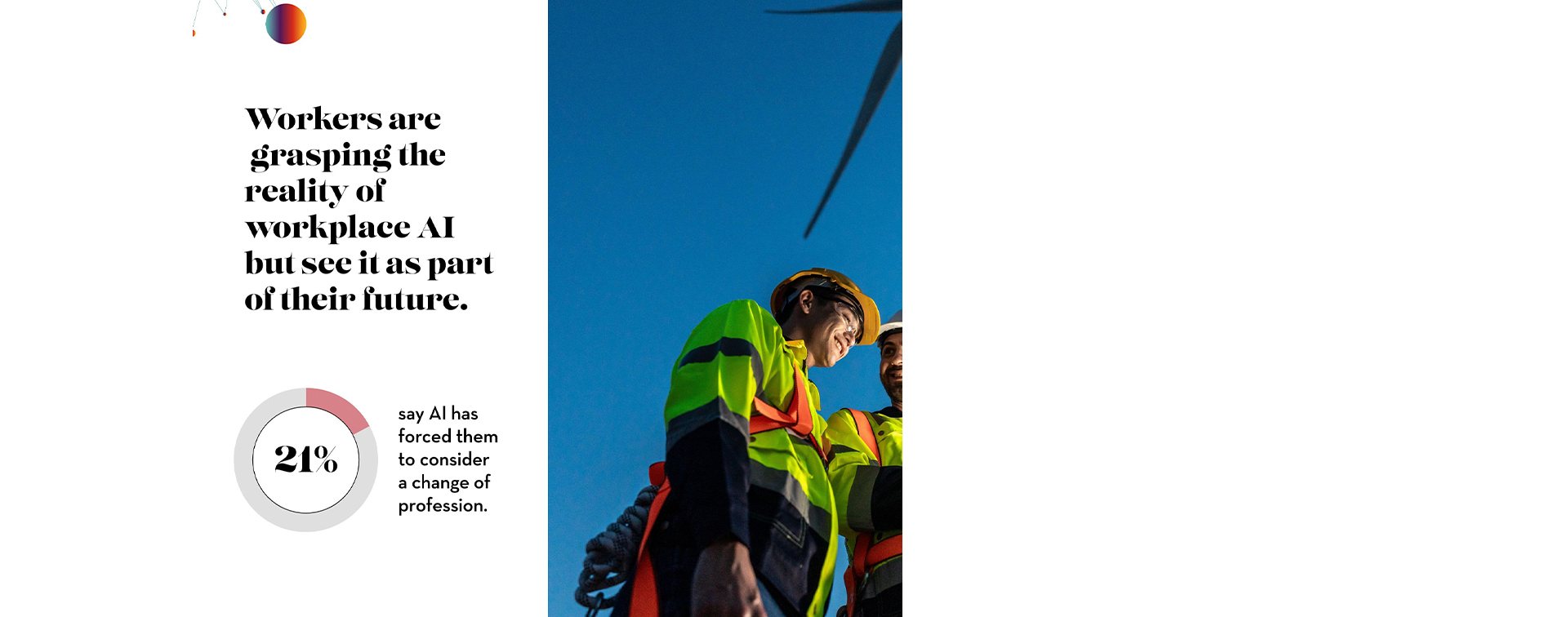Download the report
In just a couple of years, AI has evolved from a buzzword to a significant driver of change for the global workforce. Organisations are seeing measurable impacts from AI, and success in the future will hinge on enabling workforces to thrive in this new era.
The fifth edition of the Adecco Group’s annual Global Workforce of the Future report examined AI’s impact on 20 industries worldwide. Working through change: Adapting to an AI-driven world of work compiles insights from 35,000 interviews across 27 countries and investigates changes from the perspective of workers.
The verdict is clear – AI is having a bigger impact than workers expected, and employers need to support them by adapting to a world shaped by this powerful tool.
Navigating uncertainty
Our research shows that workers are worried about an uncertain future. AI-driven change is their number one concern, with two fifths (40%) of global workers worried about their long-term job security.
It’s also clear that the impact of AI was underestimated. Last year, only 8% of workers were worried about AI having a negative impact on their jobs, while this year, 13% reported having lost their job because of it. More than a fifth of them (21%) also say that AI has forced them to consider a change of profession, almost double the number of people (11%) who expected such a change in 2023.
Combined with other megatrends like an uncertain economic climate and geopolitical instability, this has resulted in more workers staying put and prioritising job security above all else. A remarkable 83% of workers are planning to stay with their current employer - the highest in three years, up from 61% in 2022.This also means that workers are keen to improve their employability by being proactive in their personal development. AI-driven change is inevitable, and workers want to be equipped for this digital transformation. As a result, they are increasingly turning to employers for guidance in their careers.

Working through change
Employers have a crucial responsibility – and opportunity - to prepare their workers for an AI-powered future. While the technology bears great potential, employers need to empower their workers if they truly want to capitalise on it in a sustainable way.
Key to this is investing in upskilling and reskilling. Such investments provide more than just individual benefits to workers – they make the organisation as a whole more resilient, more competitive, and adaptable to future challenges. AI skilling initiatives can also help address talent scarcity within the organisation, and increase workforce efficiency and agility. By ensuring equitable access to learning opportunities and providing strategic career guidance, employers can unlock productivity gains and maximise both AI and human potential.
Embracing future-focused leadership
Building and retaining a future-ready workforce requires employers to redefine their responsibilities. They need to assess the full extent of AI’s relevance in their organisation, and empower their workers to embrace this change. Transparent and clear communication about both the positive and negative impacts of AI is important, as is investment in talent development.
By supporting workers in navigating this uncertainty, employers can deliver on AI’s huge potential – redefining the future of work and creating a more sustainable world for all.
Download our 2024 report Working through change: Adapting to an AI-driven world of work to discover other key takeaways for employers and explore guidance for organisations seeking to develop an AI-ready workforce.



